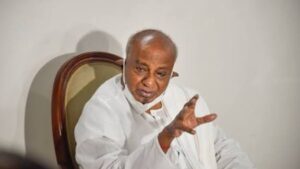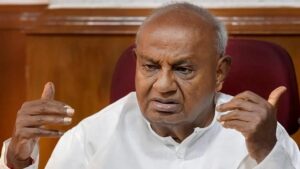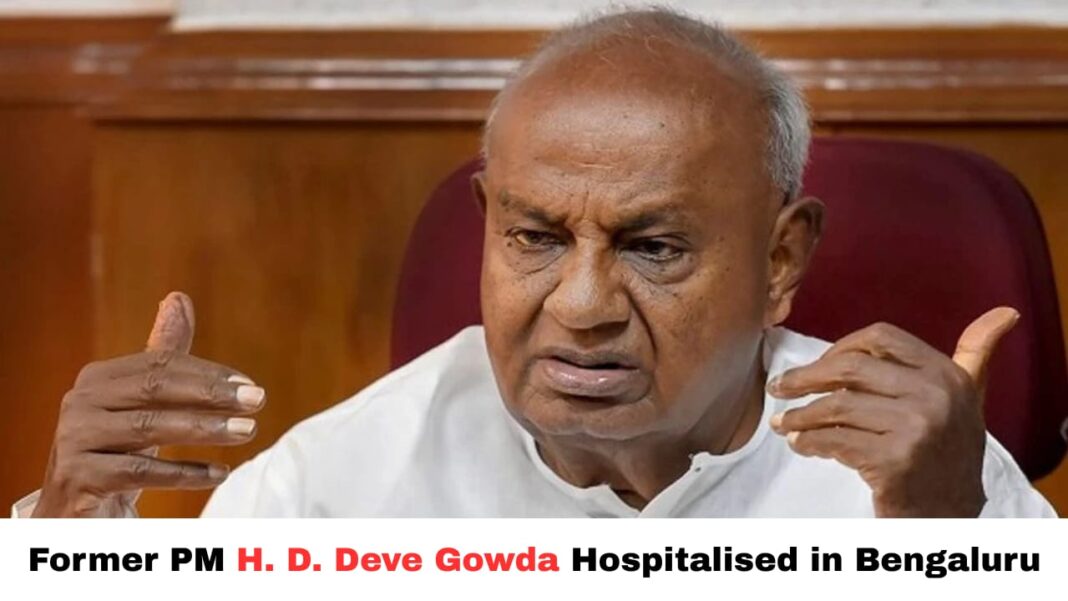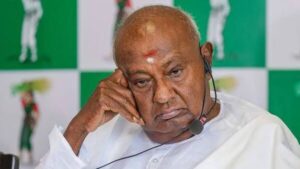Digital News Guru Karnataka Desk:
Former PM H. D. Deve Gowda Hospitalised in Bengaluru with Infection, Condition Stable
Bengaluru, former Prime Minister H. D. Deve Gowda has been admitted to a Bengaluru hospital following the onset of fever and infection. The 92-year-old statesman, a towering figure in regional and national politics, is reportedly stable and under close medical supervision.
Admission and Medical Status
According to official statements from Manipal Hospital, located on Old Airport Road in Bengaluru, Mr. Deve Gowda was admitted on Monday evening after developing chills, high fever, and symptoms suggestive of a urinary infection. The hospital’s bulletin said:

“Honourable Former PM Mr H D Deve Gowda was admitted … with an infection. He is currently undergoing medical management for the same and his progress is being monitored by a team of medical experts.”
While the hospital has not disclosed all details about his treatment or whether he is under intensive care, multiple reports suggest his condition is stable. In particular, some sources mention that the infection is urinary in nature (a urinary tract infection) and that he is being managed with medication.
Given his advanced age and long public life, hospital authorities and his family have expressed optimism but cautioned that recovery may be gradual.
Political Implications & Reactions
Deve Gowda’s hospitalization comes at a time when he continues to wield influence within Karnataka’s politics, particularly via his party, Janata Dal (Secular) (JD(S)). As a Rajya Sabha MP representing Karnataka, his presence and voice in national deliberations remain significant.
In recent weeks, he has publicly reaffirmed the JD(S) alliance with the BJP in Karnataka, indicating that the coalition would continue across local, panchayat, assembly and civic elections. Political observers and party members alike will be watching closely how his health impacts his ability to stay active and engaged in party strategy.
While dealing with his own medical crisis, Gowda’s hospitalization has sparked expressions of concern from across political spectrums. Many leaders, party colleagues and political rivals have extended best wishes for a quick recovery. Some also see a symbolic resonance: at this stage of his life, the health of such a senior figure becomes a matter of public interest and respect.
Legacy and Public Service
Deve Gowda’s political journey spans more than six decades, beginning in grassroots politics in Karnataka and culminating in his serving as India’s 11th Prime Minister from June 1996 to April 1997. He also served as Chief Minister of Karnataka (1994–1996) before entering the national stage. Over the years, he has been a vocal advocate for agrarian issues, rural development, and regional representation.

Even in his later years, he has remained active in political discourse, issuing statements, engaging with party cadre, and offering perspectives on national and regional issues. His reputation as a senior statesman ensures that developments in his personal health are closely followed by both media and public alike.
Challenges in Geriatric Care & Recovery
At 92, Gowda belongs to an age group with heightened vulnerability to infections and slower recovery trajectories. Elderly patients often face complications such as co-morbidities, weakened immunity, and greater susceptibility to drug side-effects. In such cases, medical teams tend to adopt more cautious and monitored treatment plans. While the specifics of his underlying health — such as heart or kidney functions — are not disclosed, it is reasonable to assume that the team treating him will weigh all age-related factors in their interventions.
Urinary tract infections (UTIs) in older men can sometimes progress more severely than in younger populations, particularly if there is obstruction, kidney involvement, or dehydration. Prompt detection, appropriate antibiotics, and supportive care (fluids, monitoring) are key to preventing complications. The fact that his condition is reportedly stable suggests timely management.
However, in geriatric medicine, stable is a reassuring but relative term — patients may stabilize but still require days or weeks under observation before resuming normal activity. Given his stature, any protracted stay in hospital might slow down his active participation in political work.
What to Watch Going Forward
- Update from hospital/family
The next medical bulletins will be crucial. They may provide details on diagnostics (e.g. whether there was any kidney involvement), whether he required ICU support, or whether additional tests had to be run. - Duration of hospital stay
Whether he remains in hospital for a few days or a longer duration will influence how soon he can reengage in public life or visit his home district. - Political engagement
If his recovery is smooth, one may see a return to active participation in party functions, especially in the run-up to the civic and assembly elections in Karnataka, where the JD(S) is a key player. - Succession planning / delegation
Given his age, it is possible the party may formally or informally adjust the delegation of operational responsibilities to younger leaders. How much authority he retains—or delegates—will be observed closely by political watchers. - Media & public sentiment
In contrast to when senior leaders in earlier eras became matters of private family concern, leaders of modern India often evoke public empathy, prayers, and speculation when hospitalized. The media and public will likely continue to follow developments closely.
Conclusion
The hospitalization of H. D. Deve Gowda is a reminder of the finite nature of the human body, even for enduring figures in India’s political landscape. While his political legacy is secure, his present medical condition invites concern, sympathy and careful observation.
At this moment, public reports suggest that he is under competent care, his condition stable, and his hospital team vigilant. The coming days will show how he responds to treatment, how quickly he recovers, and how his political role adapts to his health status. For now, the sentiment across parties and among citizens seems to coalesce around hope: that this respected statesman may regain strength and resume his place in India’s civic life.
You May Also Read: UK PM Keir Starmer to Visit India Oct 8-9 to Strengthen Vision 2035 Partnership









